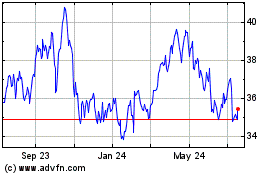BP Agrees to Draft Climate Change Shareholder Resolution -- Update
March 27 2020 - 4:28PM
Dow Jones News
By Dieter Holger
BP PLC said it has agreed to draft a shareholder resolution to
be voted on next year that would enshrine its pledge to reach
carbon neutrality by 2050, as investors urge major oil companies to
diversify their portfolios to cleaner energy.
The British energy company said the resolution would address
BP's overall greenhouse-gas emissions from its operations to the
products it buys and sells and lay out how it would boost
investment in clean energy.
"Listening and engaging with stakeholders has been an essential
part of defining our net-zero ambition and aims," Chief Executive
Bernard Looney said in prepared remarks.
In February, BP became one of the first major oil-and-gas
companies to pledge to reach net-zero emissions by 2050 in line
with the Paris Agreement, but was scant on details. It said Friday
it would provide more information at its coming capital markets day
in September and that work on a possible resolution would follow.
"Over time, as investment goes up in low- and no-carbon, we see it
going down in oil and gas," the company said.
BP said it would work on the shareholder proposal with Follow
This, a group of investors in oil-and-gas companies that push major
oil companies to fall in line with the Paris Agreement. In
response, Follow This said it has withdrawn its climate change
resolution that would have been voted on this year by BP's
shareholders.
"We believe that this goal will require a radical shift in BP's
spending away from fossil fuels to renewables," said Mark van Baal,
founder of Follow This. "We thank the investors that voted for our
climate resolution that encouraged this step in 2019."
In 2019, BP's board eventually supported a different shareholder
proposal, backed by the investor group Climate Action 100+, for the
company to provide more disclosures around its greenhouse gas
emissions and carbon-intensive investments.
Its latest move comes as energy companies are facing pressure
from investors to dial down their exposure to fossil fuels as
governments ready regulations to punish big polluters.
Last year, the British government set an ambition to reach net
zero emissions by 2050. Money managers like UBS Asset Management
and DWS Group GmbH, which is majority owned by Deutsche Bank AG,
have increasingly backed climate-change-related shareholder
proposals at companies.
BlackRock Inc., the world's largest asset manager with some $7
trillion under management, joined the now $40 trillion strong
Climate Action 100+ earlier this year and signaled this month it
would vote against corporate directors who fail to act on climate
change disclosures.
Some banks also are limiting their fossil fuel funding. Assets
on UBS Group AG's balance sheet tied to the energy and utilities
sectors, excluding renewables, water and nuclear, shrunk more than
40% last year to $1.9 billion, representing just 0.8% of the bank's
product exposure.
"BP has to change, and faster than ever, because the world is
changing fast, and so are society's expectations of us," Mr.
Looney, BP's CEO, said.
Write to Write to Dieter Holger at dieter.holger@wsj.com;
(END) Dow Jones Newswires
March 27, 2020 16:13 ET (20:13 GMT)
Copyright (c) 2020 Dow Jones & Company, Inc.
BP (NYSE:BP)
Historical Stock Chart
From Mar 2024 to Apr 2024

BP (NYSE:BP)
Historical Stock Chart
From Apr 2023 to Apr 2024
